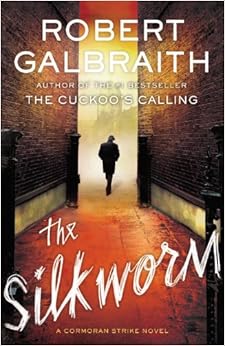If
you read my review of The
Cuckoo's Calling,
you'll know that I enjoyed it, but wasn't wowed by it. The
Silkworm,
though, was much livelier- a more complicated plot, more fully-drawn
characters, and action, action, action.
In
this, Detective Cormoran Strike's second high-profile case, a
controversial writer goes missing, and when his wife turns to Strike
for help, the result is a story of revenge, brutality, obsession,
sex, and murder. The London publishing world, with its writers,
agents, editors, and publishers (and their relationships), becomes a
kind of underworld, where adulterous liaisons and shifting allegiances
influence who publishes whom and who can bring out the next
bestseller. And when infamous writer Owen Quine threatens to
self-publish an "obscene" novel taking down almost every
one he knows, and then winds up murdered in a grotesque, sadistic
manner, Strike is hooked.
Both Strike and his assistant, Robin, are developed more fully in The Silkworm, where Robin finally articulates her interest in apprenticing with Strike, rather than just answering his phone and making appointments. We also meet more of Strike's family and friends, and we can begin to anticipate his strategy, if only in the most general way. (After all, I'm terrible at guessing who the murderer is before the author tells me).
Like
Stephen King's most recent novel (also crime fiction), Mr.
Mercedes
(2014), The
Silkworm
is very meta-literary, since Strike uses his analysis of Quine's
writing in his investigation of the writer's murder. The writings of
Quine's friends are also crucial, and the literary world itself is
turned inside-out as Strike unravels the complex web of relationships
and lies that undergird it.
So like I said, I think this second Strike novel was even better than
the first, and I'm looking forward to the third.

I really like Cormoron Strike, the big, one-legged, moody protagonist of The Robert Galbraith books. He along with his partner, the beautiful Robin, make a mismatched and yet complementary Sherlock and Watson. The interplay, the misunderstandings, the dialogues all make for an engaging read.
ReplyDeleteBut a murder mystery should ultimately be about the storyline, the plot and the characters. And these were sorely disappointing to me. The plot was so contrived, that I could not believe the story had ended the way it did even after I finished reading it. I didn't connect with all the egos and the super egos of the literary world which forms the backdrop of the story. Robert Galbraith would of course understand that environment a lot better than most readers, but surely it can't be filled with such evil and unlikeable characters. I did not like the idea of a story within a story, the long and difficult to pronounce names and most of all the way it all came together.
So why did I rate it a 2-stars, instead of 1? Because I want to give Robert Galbraith another chance. Not make 'him' think he should not write another book. He should. But I won't be waiting with bated breath to read it like I did after reading the first book 'Cuckoo's Calling'